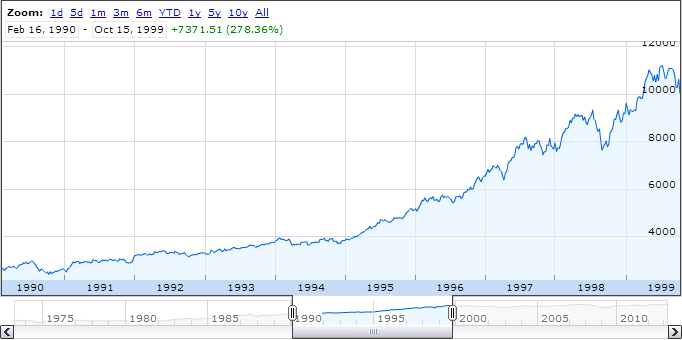Stock Trading Education: Teach Your Kids How to Trade!
[caption id="attachment_845" align="aligncenter" width="660"] Trading Education is Important From a Young Age[/caption]
Trading Education is Important From a Young Age[/caption]
 Trading Education is Important From a Young Age[/caption]
Trading Education is Important From a Young Age[/caption]Importance of Trading Education
I vividly remember the day I got fascinated by the world of trading and investing. Little did I know that the trading education I was to receive would stay with me for the rest of my life!
I was in 8th grade (as we say in the USA, the equivalent of "8th standard" here in India). One Friday afternoon, my Macro Economics teacher, one of the best teachers I have ever had, told us that we were going to have a trading/investing competition for the rest of the year. Each student was instructed to pick 30 stocks that were publicly trading on the New York Stock Exchange by Monday morning. You could either buy or short-sell stocks (no derivatives, unfortunately). Of course, we did not actually physically make the trades; we did "paper trading", or virtual trading. However, the idea was simple: the student who had the best return on investment at the end of the year would win an award (extra credit and a guaranteed A in the class. Forget parents
- good teachers are definitely the best at incentivizing 13-year-old kids to do anything!). This was my introduction to trading education.
Immediately, I started doing research into trading. What are stocks? How are stocks priced? Why do stock prices move? Why do companies issue stocks? Why do companies go public? And most importantly, how do I win this darn competition?
I did my homework over the weekend. We were due to make our "trades" the following Monday. This was back in 1999 when markets were booming. The logical choice was to pick "hot" stocks like Apple, Microsoft, IBM, etc, and to buy and hold them. The markets were booming like crazy during those times. This was the age of the Internet Boom, before the September 11th attacks, and during the Clinton era. Placing myself at the time, here is what the 10-year chart looked like for the Dow Jones Industrial Average, the "equivalent" of India's Sensex.
[caption id="attachment_822" align="aligncenter" width="682"] The Dow Jones Industrial Average: 1990 through 1999[/caption]
The Dow Jones Industrial Average: 1990 through 1999[/caption]
 The Dow Jones Industrial Average: 1990 through 1999[/caption]
The Dow Jones Industrial Average: 1990 through 1999[/caption]And that is exactly what most students did! They bought the classic blue chip stocks and hoped for a decent return on investment. If I was investing on my own and wasn't a part of a competition, that is probably what I would have done too.
But there was a catch: there was only *1 winner.*And so that's when I realized the mighty, beautiful concept of risk to reward: the more risk you take, the higher the reward you can potentially generate. There was going to be only 1 winner in the class, and we did not have any leveraged products to choose from, no margin given to us, no derivatives, no Unlimited Trading Plans and a discount broker like Upstox to trade through (just kidding on the last point :-) ). All we had were instructions to purchase or sell 30 stocks trading on the NYSE. Therefore, other than your ego getting hurt, there was no difference in coming in 2nd place versus the last place. If you didn't win the competition, you won nothing!
And so I did some more homework and came across a fascinating group of stocks called *** Penny Stocks**.*Penny stocks are, as per Wikipedia, "common shares of small public companies that trade at low prices...such stocks can be highly volatile...such stocks present a high risk for investors, who are often lured by the hope of large and quick profits".
Perfect!
See, I knew that I could end up losing money, come in the last place, and become the laughingstock of the class; but if I wanted to win the competition, I had to do it by thinking out of the box, creatively, and investing in highly risky stocks that could end up generating a huge return on investment. IBM, Apple, and Microsoft certainly were not going to do that, and therefore I was not going to win the competition.
And so I found 30 dirt-cheap penny stocks that were highly volatile and bought half of them and sold half of them. My rationale was that since I am getting involved in such volatile stocks, I don't know if the overall market is going to go up or down for the rest of the school year. I might as well apply some diversification to my portfolio! (in case you didn't catch last week's blog entry on diversification, you should read it here). I didn't know what the term diversification meant at the time, but through the entire experience, I understood it intuitively.
There was only one problem: the penny stocks were not publicly trading on the New York Stock Exchange. I asked my teacher if she could make an exception for me; it turned out that she didn't know what penny stocks were, but she gave me the approval to make the trades, figuring that since they are stocks being traded on an exchange (just not the New York Stock Exchange) there would be no harm in allowing the trades.
It was the best learning experience of my life for trading and investing. Daily, I would check on my "trades". Since my portfolio was comprised of such highly volatile stocks, my ranking against my peers would swing wildly week to week. It was an absolutely amazing experience. Almost daily, I would check up on my stock prices, sometimes even during the middle of the day by accessing a computer in the school! Through that entire experience, I was learning so many things that you can never learn by reading books.
At the age of 13, I got a true feel for the markets.
And so, at the end of the year, guess what happened: I won the competition! It wasn't even close: I absolutely destroyed everybody in the class. Of course, I could have easily come in the last place due to my highly risky stock selections, but that was not the point: I knew that if I wanted to win, I had to do something differently. And I won.
The Importance of Starting Early in Stock Market
I see it every day: friends, parents, strangers, colleagues, strangers, all ask me the same questions: how do I get started in trading? What stocks should I invest in? I respond with the same question every time: when did you start trading? The answer is usually one of the following:
-
I have never traded (I am a beginner).
-
I don't trade much; I have an RM (relationship manager) that trades on my behalf.
-
I trade every now and then but don't have much interest in trading. I just want to make some money!
There is a problem with these answers. Although it is never too late to start trading, what these people failed to understand is that ***starting early is the absolute best way to start trading.***Out of the three answers, I respect the first one the most. The other two? Not so much.
To put it very bluntly, I would encourage parents to teach their children how to trade or invest from as early an age as possible!
There is a stigma in our society. Trading is almost looked upon as a hobby, as a pass-time, as something one indulges and gets interested in when they have some extra funds laying around, or if they are looking for a job. The trader is usually in his (sorry, but it isunfortunately acquainted with males) mid to late 20's
- 40's, middle/upper class, and has some extra cash with which he does not know what to invest in.
That is the wrong approach. The right approach is to learn about trading as early as possible and to become acquainted with the concepts of trading and investing at an early age.
If you look at the example that I wrote about from 14 years ago, I learned so many valuable lessons from that trading competition at the age of 13:
-
The concept of risk and reward. No school course or examination will ever teach a 13-year-old the concept of risk and reward the way I was able to grasp the concept so quickly. That concept stays with you forever; every decision we make in life involves risk and reward.
-
Diversification: I learned the power of diversification. There was no way that all 30 stocks were going to generate returns; but by diversifying across 30 stocks and buying half of them and short-selling the other half, I learned the intuitive benefits of diversification. It would be 4 years later before I learned the dictionary definition of "diversification" in school, but in my mind, I knew what diversification meant in a practical sense.
-
A practical introduction to finance at the age of 13. I understood how and why IPO's get issued, how stocks are priced, how news affects stock prices, etc. When you check up on something every single day, you are bound to learn a lot about it.
-
I became passionate about trading, without even realizing it. I checked up on my portfolio daily. Through the entire experience, I learned so many subtle lessons about investing and trading that stayed with me for the rest of my life.
Don't get me wrong: it is nevertoo late to get the trading education. Even if you're just looking to invest/trade part-time, educating yourself is the most important thing you can do. But educating early is the absolute best thing you can do. Even if you don't end up trading actively, the lessons you learn to stay with you forever.
If you have kids, get them educated in trading the same way you would get them educated in maths, science, and hobbies such as sports. Trading is a wonderful way to nurture creativity and to let one think "outside the box".
After all, it is the traders who think "outside the box" that end up becoming the best traders, because they are not afraid to think differently and trade creatively. Trading education from an early age is important. Start early, and you will end up trading more confidently.
As Warren Buffett famously said, "Risk comes from not knowing what you're doing." Educate yourself early, and you will end up knowing what you're doing :-)